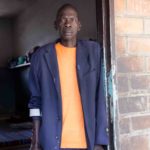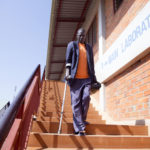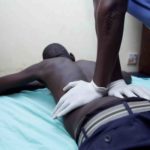HEALING AFTER MIGRATION
John Ewi was the go to man for solutions in his village. Being the sub – county Chief, he was always consulted and invited to resolve conflicts and preside over cases in Mangole village, South Sudan.

This was a role he prided in because it was given to him by the government of his country and it fetched his family a lot of respect from the natives.
As part of his job, Ewi regularily traveled to the city (Juba) for meetings with other local leaders in South Sudan. However, on a fateful day in 2013, he did not make it to the meeting as the taxi he had boarded was ambushed by rebels as they approached Nisitu, before getting to Juba.
From that day, he has carried a vivid memory of the random and massive gun shots at the taxi that left both the driver and all the other seven passengers soaked in a pool of blood and dead on the instant.
He still can not explain how he survived the bullets, but he remembers having run away from the taxi to flee the soldiers as soon as the gunshots ceased for a few seconds. The soldiers noticed him run and kept shooting at him. A bullet pigment hit his hand and in shock, he fell on a big rock that left him with a broken hip bone in his right thigh.
The pain in his right thigh got him stuck, unable to move. Later, he was rescued by soldiers who had been deployed to fight the rebels. The soldiers dropped him at Nimule hospital and continued in their treks to find more people like Ewi, who needed rescue from the rebels.
Fortunately for Ewi, he was reconnected to his relatives but the peace was short lived as later in 2016, the rebels this time attacked his home village in Mangole, South Sudan, killing masses of people and burning down homesteads.
The attacks in 2016 forced the entire Equotoria region to flee to the Uganda reception centre in Eregu. It is from here that Ewi John, together with his family (wife and three children) were relocated to Maji 2 refugee settlement in Adjumani district, Uganda, which has since been their home after migration.
I met John at Lacor hospital in Gulu. He is here for treatment and physiotherapy as he has never received full treatment since the gun shot in 2013. Six years later, the pain has only grown worse to the extent of affecting his right leg. He can only move with a walking aid, but even then for only short distances with excruciating pain.

John will go through this process one step at a time with regular physiotherapy massages from the Doctors at Lacor hospital, with support from Refugee Law Project, School of Law, Makerere University.

The pictures below, paint a picture of John’s current health journey, one day at a time. This is the second of many stories under the After Migration Series.
ABOUT AFTER MIGRATION
After Migration Series (AMS) focuses on the survivors of violent wars seeking sanctuary in Uganda as well as their generous hosts who have also experienced unspeakable legacies of wars. Herein, we shade light on stories and experiences of refugees and hosts, away from the popular statics to in-depth personal narratives by the very people that have lived and continue to live these uncomfortable realities.
In unpacking these realities, we shall delve into a continuing photo series by documentary photographer Watsemba Miriam, where we explore; What happens to their health? How do these people move on (if at all they do)? Who helps them move on? What happens when refugee settlements become their new ‘home’? What are their hopes and dreams of life? How has life changed for them now? And what more can be done to expedite their physical, psychological, and economic recovery?
John is escorted out of Lacor hospital patients' shelter by Refugee Law Project officers to go see the Doctor for a follow up treatment appointment. This is at about 10am in the morning.
John is just one representation of many refugees who have suffered disabilities as effects of post war wounds.
He has to wait for close to thirty minutes for his file to be looked up and updated for the day before he proceeds for the day's physiotherapy session.